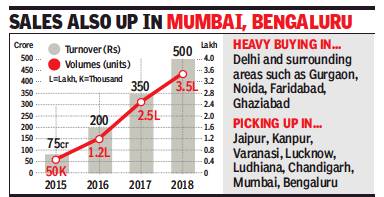Air purifiers: India
This is a collection of articles archived for the excellence of their content. |
Sales
2015-18

From: Pankaj Doval, Air purifier business booms, volumes up 3-fold in 2 years, November 5, 2018: The Times of India
As concern over air pollution grows, one industry has been going from strength to strength. Air purifiers, which till just three years back were a rare commodity bought mainly by those with respiratory ailments, have now emerged as a ‘sunrise’ sector where volumes are up nearly three-fold in two years.
Air purifiers are increasingly finding resonance with buyers, prompting a variety of companies — from MNCs to local makers — offering products ranging from around Rs 7,000 to nearly a Rs 1 lakh, for machines capable of tackling even the minutest of pollutants (up to 0.1 microns) and hazardous gases in the air.
“The level of pollution has risen dramatically over the last few years, and it is worrisome. We are currently witnessing heavy demand as consumer concern goes up around this time of the year,” Ahraaz Khan, marketing head of Honeywell Building Technologies, told TOI.
Big players vie for air purifier space
Companies offering air purifiers now include Dutch multinational Philips, Britain’s Dyson, Sweden’s Blueair, America’s Honeywell, and Korea’s Samsung, apart from local players such as Kent, Havells and Aquaguard.
As one would expect, the biggest market for air purifiers is in north India, which has many of the worst air-polluted cities in the world. These include Delhi, Noida, Ghaziabad, Faridabad, Jaipur, Kanpur, Varanasi, Lucknow and Ludhiana, many of which have already seen “severe” air quality index in excess of 400, even when Diwali — which further aggravates particulate emissions — is yet to be celebrated.
However, officials say demand is rising in cities outside north India as well. “In Bengaluru, there are instances of allergy due to pollen, while in Mumbai, the metro construction and general vehicular pollution is adding to dust,” Honeywell’s Khan said.
Philips was one of the early entrants in the category and had started campaigns around air purifiers in 2014. “While earlier the buyers were from the affluent sections, now we are finding consumers even from the middleclass and other categories,” Gulbahar Taurani, marketing director for personal health segment at Philips India, said.